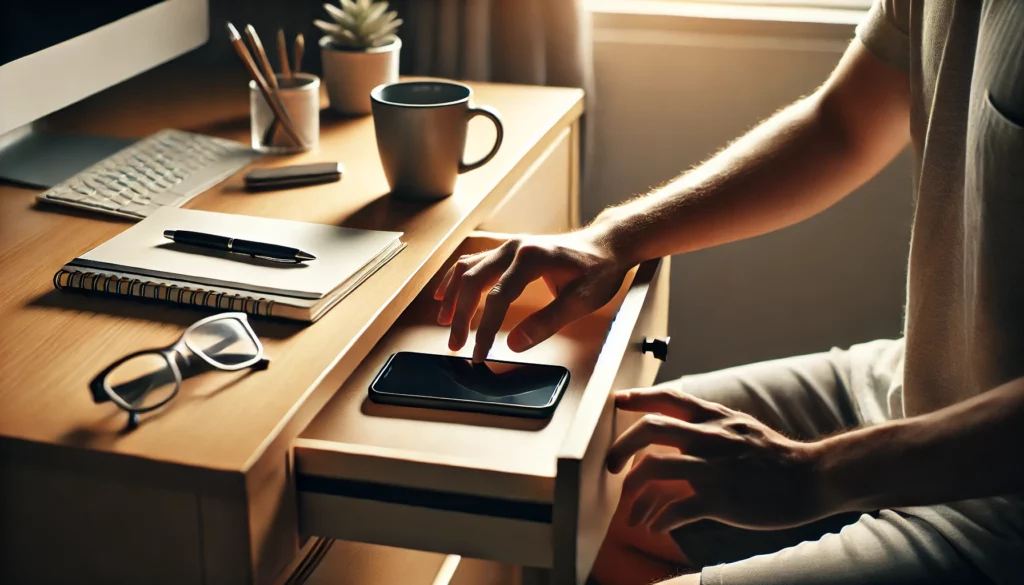One of the most common habits today is reaching for the phone right after waking up. Whether it’s to check emails, scroll through social media, or catch up on the news, many people are already mentally plugged in before they’ve even gotten out of bed.
It might feel like a harmless routine, but starting the day with screen time can quietly drain your focus, trigger stress, and set a reactive tone for the rest of your day. The moment you check your phone, your attention is pulled in a dozen directions—none of them set by you.
If you’re looking to protect your mental clarity and start your mornings with more purpose, breaking the habit of checking your phone first thing might be one of the most impactful changes you can make. Here’s how—and why—it works.
Why Your Phone Disrupts Morning Focus
Your brain is in a sensitive and receptive state in the first moments after you wake up. It’s the perfect time for deep thinking, creative ideas, and setting your intentions for the day. But when you check your phone immediately, all of that gets pushed aside.
You overload your mind with notifications, messages, and media before you’ve even had time to think. You may see something stressful or upsetting, which can increase anxiety before your day even begins. And once your brain gets used to this instant stimulation, it becomes harder to focus on tasks that require patience and deep work later on.
In short, your attention becomes scattered before you’ve had a chance to use it intentionally.
Keep Your Phone Out of the Bedroom
One of the simplest and most effective strategies is to physically separate yourself from your phone. If it’s within reach, you’re far more likely to grab it without thinking. By leaving it in another room overnight, you make it easier to resist the urge.
Try using a traditional alarm clock instead of your phone to wake up. If you’re worried about missing something urgent, you can always check your messages after you’ve gone through your morning routine. The key is to give your brain a chance to fully wake up without distractions.
Replace the Habit With Something Better
If checking your phone is the first thing you do, that moment likely represents a mental cue. Your brain is looking for stimulation, comfort, or direction. Instead of removing the habit completely, replace it with one that brings you clarity or energy.
You might start with a glass of water, a few stretches, writing down your goals, or simply opening the window and taking a few deep breaths. The goal is to fill that mental space with something intentional and beneficial.
Set a Time Limit for Phone-Free Mornings
If quitting your phone cold turkey feels too extreme, create a simple rule: no phone for the first 30 minutes after waking up. You can increase that time later, but even half an hour without digital input can make a noticeable difference in how focused you feel.
Make it part of your morning routine. Use the time for reflection, planning, exercise, or quiet. Keep a habit tracker or set a reminder in your journal to hold yourself accountable and stay consistent.
Use a Physical Planner
Many people justify grabbing their phone because they want to check their calendar or to-do list. But this often leads to scrolling through messages or social media before you realize it. A simple solution is to use a paper planner or notebook instead.
Before you go to bed, jot down your top priorities for the next day. In the morning, you can focus on your list without having to unlock a screen and risk being pulled into distractions.
Turn Off Notifications in the Morning
Even if you’re trying to be mindful, it’s hard to ignore a buzzing phone. Turning off notifications or using “Do Not Disturb” mode can help you stay in control. You can schedule it to remain on for the first hour of your morning.
This way, you wake up in a calm, controlled space—not one defined by someone else’s urgency or algorithm.
Change Your Phone’s Appearance
Your phone is designed to be engaging. The colors, the layout, the instant access to apps—it all encourages you to interact. But you can tweak that to your advantage.
Try switching your phone to grayscale mode in the morning. Remove apps from your home screen, or move them into folders. The less visual stimulation you have, the easier it becomes to delay usage until later in the day.
Create a Morning Phone-Free Zone
Designate part of your home—like the kitchen, bathroom, or dining area—as a phone-free space. This helps reinforce boundaries and keeps your morning routine focused on being present.
Having breakfast without your phone, for example, allows you to start the day more mindfully. You can think, plan, or just enjoy the quiet without scrolling through information you didn’t ask for.
Invite Accountability
If you’re serious about reducing phone time in the morning but find it tough to stick with it, bring someone else into the process. A friend, partner, or coworker can help keep you motivated.
You can even make it a shared goal or challenge. Compare progress, celebrate milestones, and support each other when it gets tough. Knowing that someone else is working on the same habit makes it easier to commit.
Making It Stick
Like any new habit, avoiding your phone in the morning takes time and patience. Start with a small goal—even 10 minutes can be a win. Focus on consistency rather than perfection.
Track how you feel each day. Are you more focused? Calmer? More productive? Use those small wins as motivation to keep going. You can also reward yourself for your progress with something meaningful, like enjoying a slower breakfast or taking time for a hobby you love.
Take Back Your Morning
Your morning is yours—don’t let it be hijacked by someone else’s priorities, notifications, or content. When you resist the urge to check your phone first thing, you give your brain the breathing room it needs to focus, create, and lead the day with intention.
Start tomorrow by keeping your phone out of reach and choosing one activity that puts you in the driver’s seat. You might be surprised how much more energy and clarity you have when you start your day on your own terms.
Gabriel Silva is the founder of Cursos e Soluções, a blog dedicated to personal growth, habit change, and self-discipline. Passionate about self-development and productivity, he shares practical, research-backed strategies to help people achieve their goals. He believes that small, consistent changes can lead to significant transformations over time and is committed to providing content that empowers both personal and professional success.







